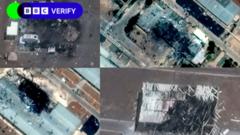As conflict ensues between Israel and Iran, the situation escalates with Israel targeting Iranian nuclear sites and vital energy infrastructure, prompting fears of a regional war impacting global oil markets and security dynamics.
**Escalating Conflict: Israel's Airstrikes Target Iran's Nuclear and Energy Infrastructure**

**Escalating Conflict: Israel's Airstrikes Target Iran's Nuclear and Energy Infrastructure**
Amid rising tensions, Israel intensifies attacks on Iran's strategic sites, including its nuclear facilities and oil infrastructure.
June 14, 2025 - As the conflict between Israel and Iran escalates, Israel has launched a series of airstrikes targeting critical sites in Iran, including its once-protected nuclear facilities and vital energy infrastructure. This follows Israel's assertion that such attacks are necessary due to ongoing Iranian missile threats.
On Thursday night into Friday, Israeli fighter jets hit several nuclear-related sites, with a specific focus on Tehran's Mehrabad International Airport and military installations. Reports indicate that Iranian air defenses were neutralized during these raids. Brig. Gen. Effie Defrin of the Israeli military stated that these operations marked “the deepest penetration we have ever made into Iranian airspace,” emphasizing the newfound freedom to act against Iranian capabilities without significant retaliation.
The Israeli strikes initially aimed at disarming Iranian defenses shifted on Saturday to a broader assault targeting the country's critical oil and gas facilities. Among the sites hit was the major Shahran fuel depot near Tehran, where massive explosions were reported, causing fires that lit up the sky. Local residents described the blasts as similar to earthquakes, with serious damage reported across surrounding neighborhoods. Witnesses indicated that the series of explosions prompted emergency responders and the Iranian oil ministry to mobilize quickly, fearing potential catastrophes from the blaze engulfing storage tanks.
In a swift counter, Iran commenced missile strikes directed at Israeli cities, marking a dramatic escalation in the already volatile conflict. Reports from Tel Aviv stated that civilian victims have been reported due to missile strikes launched from Iranian territory, with at least a dozen casualties over the past few days. The casualty figures are expected to climb, and both sides exist in a precarious state of retaliation—leading to fears that further military involvement could bring in larger powers, such as the United States.
The Israeli government has reiterated its justification for these strikes, arguing they are essential to safeguard its citizens from perceived threats posed by Iranian missile capabilities and nuclear intentions. U.S. Secretary of State Marco Rubio stated that any support for Israel's actions would recognize their right to defend themselves against hostile attacks.
As tensions rise, both Iran and Israel appear prepared for a lengthy confrontation that may destabilize the region further. Global energy markets are already reacting, with indications of soaring oil prices in anticipation of ongoing combat affecting supply lines. Experts warn that an extended conflict could lead to grave consequences across the Middle East, with ripple effects on global oil supply chains.
The international community is now urging both sides for restraint, complicating the geopolitical landscape as regional powers respond to the shifting military dynamics.
On Thursday night into Friday, Israeli fighter jets hit several nuclear-related sites, with a specific focus on Tehran's Mehrabad International Airport and military installations. Reports indicate that Iranian air defenses were neutralized during these raids. Brig. Gen. Effie Defrin of the Israeli military stated that these operations marked “the deepest penetration we have ever made into Iranian airspace,” emphasizing the newfound freedom to act against Iranian capabilities without significant retaliation.
The Israeli strikes initially aimed at disarming Iranian defenses shifted on Saturday to a broader assault targeting the country's critical oil and gas facilities. Among the sites hit was the major Shahran fuel depot near Tehran, where massive explosions were reported, causing fires that lit up the sky. Local residents described the blasts as similar to earthquakes, with serious damage reported across surrounding neighborhoods. Witnesses indicated that the series of explosions prompted emergency responders and the Iranian oil ministry to mobilize quickly, fearing potential catastrophes from the blaze engulfing storage tanks.
In a swift counter, Iran commenced missile strikes directed at Israeli cities, marking a dramatic escalation in the already volatile conflict. Reports from Tel Aviv stated that civilian victims have been reported due to missile strikes launched from Iranian territory, with at least a dozen casualties over the past few days. The casualty figures are expected to climb, and both sides exist in a precarious state of retaliation—leading to fears that further military involvement could bring in larger powers, such as the United States.
The Israeli government has reiterated its justification for these strikes, arguing they are essential to safeguard its citizens from perceived threats posed by Iranian missile capabilities and nuclear intentions. U.S. Secretary of State Marco Rubio stated that any support for Israel's actions would recognize their right to defend themselves against hostile attacks.
As tensions rise, both Iran and Israel appear prepared for a lengthy confrontation that may destabilize the region further. Global energy markets are already reacting, with indications of soaring oil prices in anticipation of ongoing combat affecting supply lines. Experts warn that an extended conflict could lead to grave consequences across the Middle East, with ripple effects on global oil supply chains.
The international community is now urging both sides for restraint, complicating the geopolitical landscape as regional powers respond to the shifting military dynamics.





















